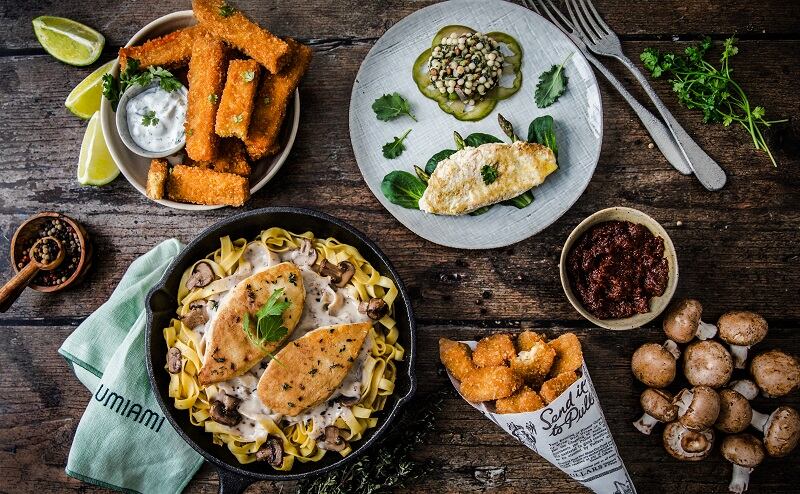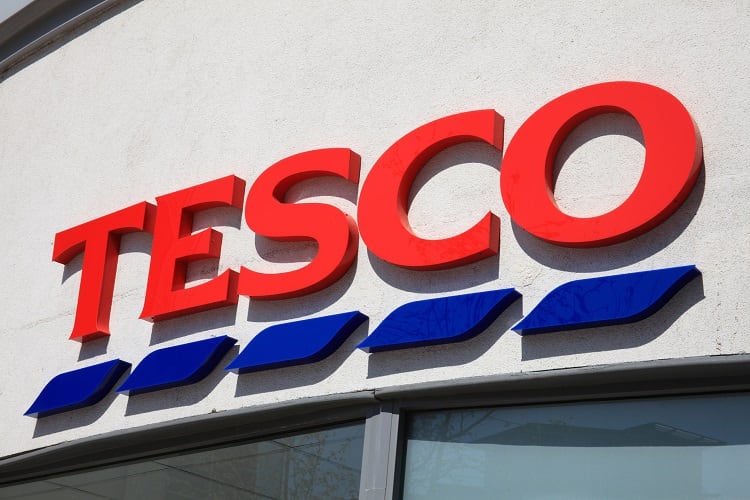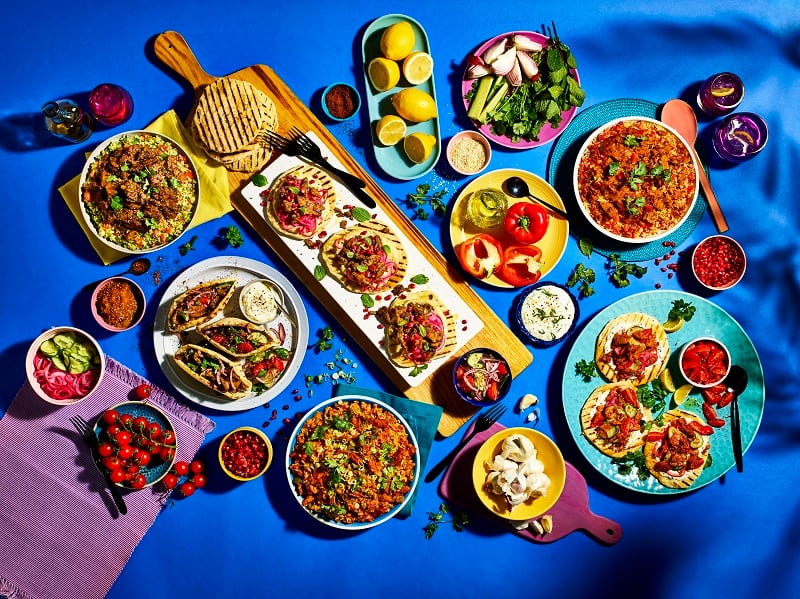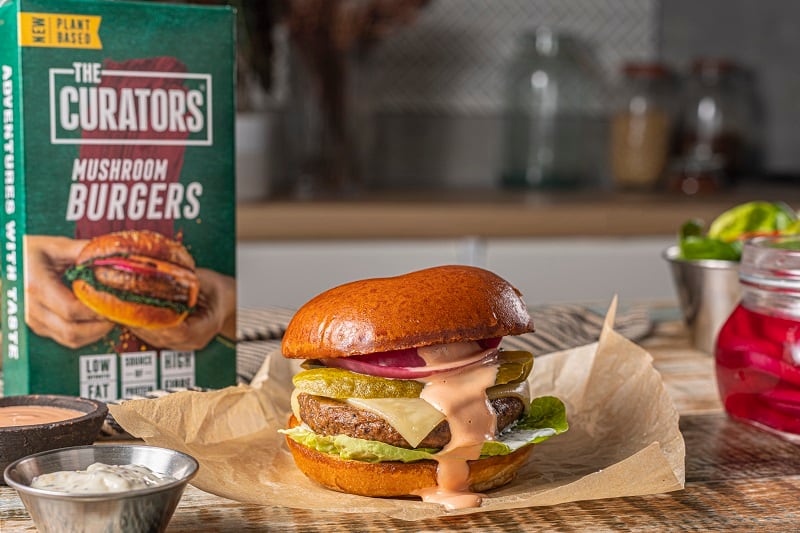Paris-based Umiami claims its technology can create thicker cuts of substitute meat, thus solving the texture challenge that currently vexes the faux meat market.
Quorn currently makes mycoprotein – the dough-like material which makes up most of its products – by fermenting a naturally occurring fungus (called Fusarium venenatum). This is fed with oxygen, nitrogen, glucose, and minerals in 40-metre high fermenters which run continuously for five weeks at a time.
Improving taste and texture challenges to win over new shoppers
But the company wants to look to other proteins and technologies to make new products of appeal to the rising numbers of flexitarian consumers who say they want to cut their meat consumption for environmental, health and ethical reasons. These newer consumers, says Quorn, don’t compromise on flavour, texture and appearance of these products. The challenge to producers therefore is to make plant-based products with improved organoleptic and nutritional qualities in order to win over these newer cohorts of meat alternatives eaters.
Via the latest Future Food-Tech innovation challenge which aims to unlock new talent in the industry and create opportunities for collaboration, Quorn tasked start-ups to make products that can mimic whole meat cuts. “We’re focused on chicken,” said Simone Sheehan, Head of Consumer and Sensory Science at Quorn. “We all know the flexibility it offers from having it in a sandwich to the ultimate roast meal where family and friends can come together. What we want to be able to give consumers is an amazing food experience that isn’t a compromise. We want to be able to offer a plant-based experience that replicates what consumers can get from chicken today so they can make that transition to plant-based easy. We want to work with innovators to be able to create replicas of whole muscle experience: the texture, the flavour, the aromas through into the meat-free sector.”
The winning pitch was Umimai’s. The young company – which began life as an idea among three friends at a Paris engineering and science university -- is bringing to the table what it calls new generation texturization technology to ‘create the world’s first plant-based whole chicken and cod cuts at scale’.
“Almost all companies in the plant-based field currently use the same high moisture extrusion [HME] technology to create the long fibres of meat,” explained co-founder Martin Habfast.
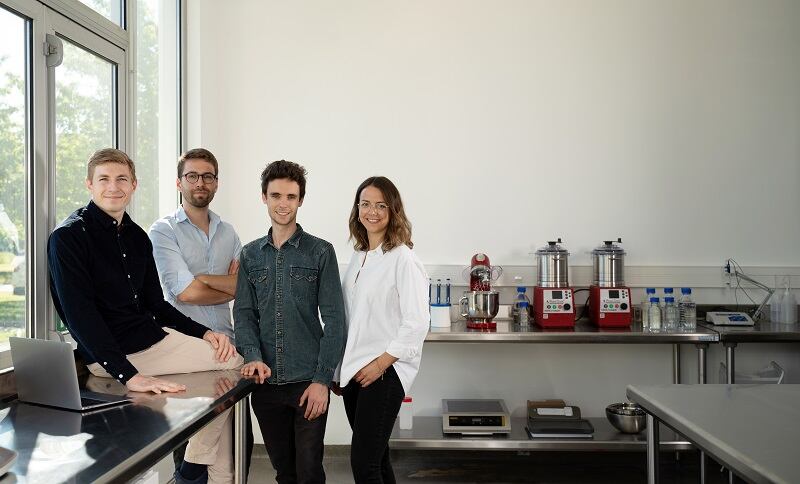
The limits of HME
HME – where plant proteins are heated in a twin-screw extruder then cooled in a precisely thermal-controlled dye leading to the formation of fibers -- is great for making numerous aligned fibres which can be cut and flavoured to create, for example, a small substitute chicken piece. But it isn’t a great way to create big blocks and whole meat cut applications such as a chicken breast, according to Habfast. “With HME, you’re limited to products of 1 or 1.5cm in size because of the thickness of the cooling dye,” he said. “You’re also limited in terms of water and fat content. That’s a problem if you want to re-create plant-based fish or meats that have more fat content.” He added: “The flavours also only tend to be on the surface of the product. If you put them at the beginning of the texturization process they get burnt in the extruder. They are usually added afterwards so they remain on the surface and the centre of the product is plain.”
Umiami’s solution is proprietary technology that differs from conventional extrusion by limiting the number of processing steps to create thick and fibrous whole pieces of plant meat without texturing agents.
Whereas HME creates only horizontal or V-shaped fibres, the start-up’s process creates horizontal, diagonal or vertical fibres meaning, allowing it to better replicate the texture of real meat, it claims.
'A novel alternative to the extrusion technique used by almost all plant-based meat producers'
“To the best of our knowledge we are the only company in the world using our process,” he said. “We can get up to 8 cm of thickness, five times what HME can do. We also have more room to play with in terms of water and fat content.
“We mainly use soy, but our process works with any protein, so our plant-based chicken nuggets are pea-based. Our process basically consists of creating aligned fibers out of plant proteins. By controlling the direction of the fibers, the thickness of the product, the water and fat content, and the flavoring, we can create a very wide range of whole-cuts.”
Umiami also says its technology does not require the addition of texturing agents such as methylcellulose and gums. By comparison, an extruded nugget generally requires 30 to 40 additional ingredients, including many texturing agents, while Umiami uses about ten. “We know that consumers are increasingly sensitive to the ingredients used by the industry,” said Habfast.
Quorn will now provide resources and support such as research and consumer understanding capability to the Parisian start-up. “Umiami’s idea stood out due to their focus on technical solutions that address the key consumer-innovation challenges around whole cuts. We look forward to collaborating with Umiami to truly delight consumers,” said Sheehan.
“The technology they’ve developed and their ability to really replicate that whole muscle experience to give that succulency is really exciting.”
€2.3m fund raise
Investors clearly agree. The company, which was officially launched in May 2020 with the support of AgroParisTech and the Technical University of Munich, has just raised €2.3m to develop its pilot production site. This should start in early 2022 in the Paris region with a capacity of 100 tonnes per year. The company has opted for a white-label marketing strategy on behalf of specialty brands, private labels and the foodservice industry. Discussions are currently underway with some forty potential partners.
To accompany its scaling up, Umiami has recruited Guillaume Feneyrou, who spent more than 20 years at Nestlé, as Industrial Director. The first product range includes chicken breasts, cod and nuggets. The capital raise will also allow Umiami to continue its R&D efforts to expand its product range, it said.


